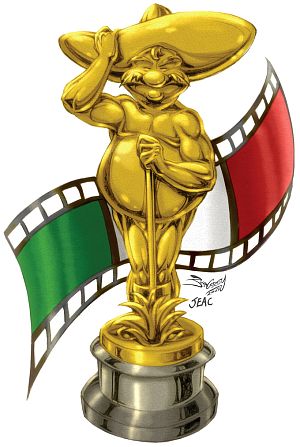Hollywood, CA - With several Latin Americans being recognized for their work in the film industry with Oscar nominations at this year's Academy Awards, being held in Los Angeles this Sunday, we thought we'd take a look at some of the best Mexican movies of all time.
With works spanning a broad range of styles, from comedies to drama and thrillers, many of the best Mexican movies have found critical and commercial success in the United States and elsewhere in recent years, winning major awards and expanding the reach of the audience for Mexican artistry.
10 Best Mexican Movies:
1. Y Tu Mama Tambien: A stark, funny, and sometimes haunting look at personal and sexual politics, this film earned director Alfonso Cuaron and his brother Carlos nominations for Best Original Screenplay at the 2002 Academy Awards. One of the best Mexican movies of the 2000s, it also helped launch the careers of stars Gael Garcia Bernal and Diego Luna.
2. Like Water for Chocolate: Based on a story by Laura Esquivel and directed by her then-husband Alfonso Arau, "Like Water for Chocolate" became the highest-grossing Spanish-language film of all time in Mexico after its release in 1992. The erotic story focuses on forbidden love and the sensual nature of cooking.
3. Amores Perros: The first of three films revolving around the random nature of death from Alejandro Gonzalez Inarritu, "Amores Perros" focuses on how one tragic car accident impacted three unrelated groups of people. Considered one of the most innovative Mexican movies in recent times, this film has been compared to Quentin Tarantino’s Pulp Fiction.
4. Pan’s Labyrinth: Along with Alfonso Cuaron and Inarritu, "Pan’s Labyrinth" director Guillermo del Toro is considered to be one of the best Mexican movie directors and one of the "Tres Amigos" of Mexican cinema. A dark fairy tale set in post-Civil War Spain, "Pan’s Labyrinth" earned a Best Foreign Language Film Academy Award nomination and won three other awards.
5. El Mariachi: Made for a shoestring budget of $7,000 and intended for the Mexican home movie market, Robert Rodriguez’s tale of a guitar player turned vigilante launched his career. He would return to the story for the big-budget remake Desperado starring Antonio Banderas and Salma Hayek.
6. Rudo y Cursi: Reuniting "Y Tu Mama Tambien" stars Bernal and Luna with Carlos Cuaron, Rudi y Cursi tells the story of a pair of lower-clas brothers attempting to become professional soccer players. While broader and more slapstick than the artist's previous pairing, Rudo Y Cursi mixes humor with political messages about class structures to become one of the best Mexican movies in recent years.
7. Nosotros los Pobres: Directed by Ismael Rodriguez, "Nosotros los Pobres" became the biggest film of the Mexican Golden Age of cinema when it was released in 1948. Unlike most Mexican movies of the time, this one avoids cliches, cheap laughs, and overt melodrama to present a portrait of the poor in Mexico that stands up today.
8. Cronos: The first of del Toro’s movies to receive a theatrical release in the United States, "Cronos" is a psychological thriller which owes a strong debt to the works of David Cronenberg.
9. Babel: Released in 2006 as the final part of Inarritu’s trilogy of death, "Babel" was nominated for seven Oscars including Best Picture. It uses three stories to show how language can unite or isolate individuals.
10. Lucia, Lucia: The 2003 release by Antonio Serrano follows the journey of a children’s book writer dealing with the apparent kidnapping of her husband. Cecila Roth shines in one of the best Mexican films ever, giving fullness to the title character.


